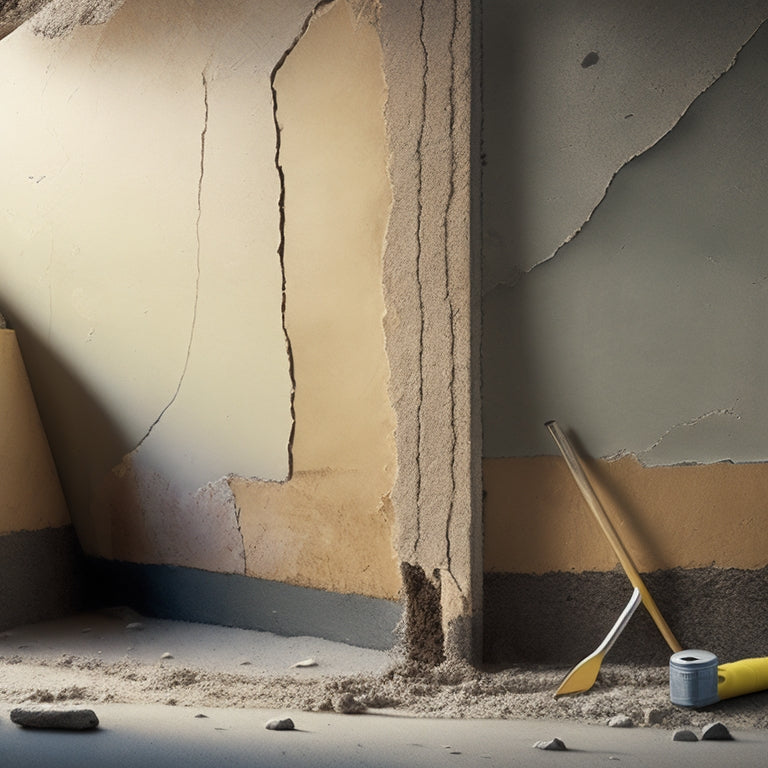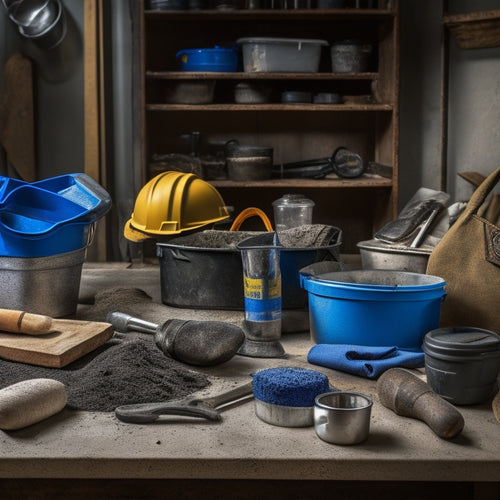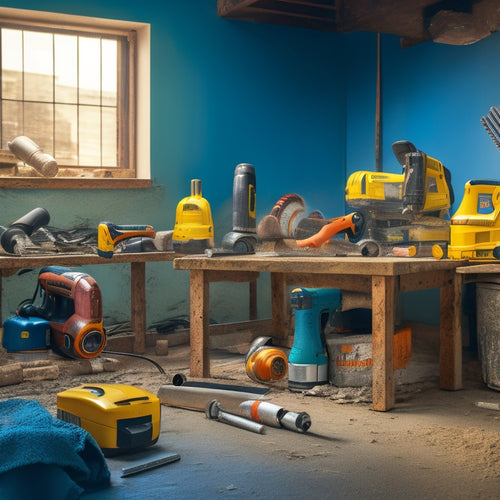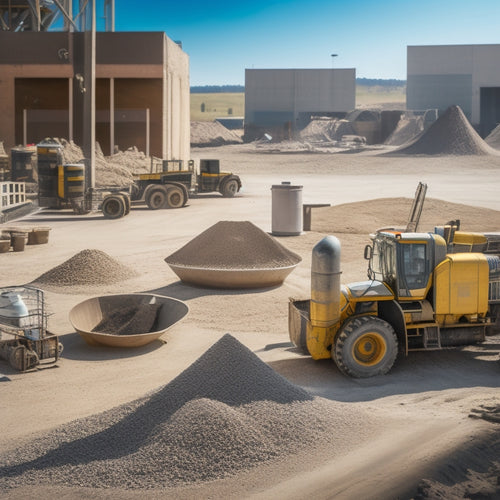
Top 3 Tools for Concrete Foundation Wall Sealing
Share
You'll need three essential tools to effectively seal your concrete foundation walls: a pressure washer to clean and remove dirt, a wire brush or scraper to eliminate loose debris and roughen the surface, and application tools like rollers, brushes, and squeegees for even sealant application. These tools guarantee a clean, dry surface, proper surface preparation, and peak bond between the sealant and concrete. By having these tools in your toolkit, you'll be well on your way to a successful concrete foundation wall sealing project - and understanding the more advanced solutions and best practices can further enhance your results.
Key Takeaways
- A pressure washer is essential for cleaning surfaces and removing dirt, grime, and old coatings before sealing.
- A wire brush or scraper is necessary for eliminating loose debris and roughening the surface for better bonding.
- Application tools like rollers, brushes, and squeegees ensure even sealant application and optimal results.
- Surface preparation is critical, as a clean and dry surface is necessary for proper sealant adhesion.
- Material compatibility and tool selection based on operating environment, ease of use, and maintenance needs are also crucial.
Essential Sealing Tools for Beginners
When venturing into concrete foundation sealing, having the right tools is essential for a successful project. You'll need to guarantee you have the necessary equipment to prepare the surface and apply the sealing materials correctly.
Start with a pressure washer to clean the surface, removing dirt, grime, and old coatings. This will give you a clean slate to work with, allowing the sealing materials to adhere properly.
Next, use a wire brush or scraper to remove any loose debris and roughen the surface, creating a better bond between the concrete and sealant.
For applying the sealing materials, you'll need a variety of tools, including rollers, brushes, and squeegees. These will help you achieve an even, consistent coat, guaranteeing the sealant is applied correctly and effectively.
Don't forget to have a clean, dry surface before applying the sealant, as any moisture or contamination can compromise the seal.
Advanced Sealing Solutions for Walls
You've prepared the foundation floor, now it's time to focus on the walls. When it comes to advanced sealing solutions for walls, you'll want to explore cutting-edge materials and waterproofing technology that can provide long-term protection against water ingress and structural damage.
One such solution is the use of polyurethane-based sealants, which offer superior flexibility and adhesion to concrete substrates. These sealants can be applied to both new and existing structures, providing a reliable barrier against water and air infiltration.
Another option is the application of acrylic-based coatings, which can be tailored to specific project requirements and offer excellent durability and UV resistance.
When selecting advanced sealing solutions for walls, consider factors such as compatibility with the substrate, tensile strength, and resistance to chemicals and abrasion.
It's also crucial to verify that the chosen solution meets local building codes and regulations. By specifying the right advanced sealing solution for your wall project, you can achieve a high-performance waterproofing system that guarantees the integrity of your structure for years to come.
Best Practices for Tool Selection
Frequently, contractors and builders find themselves overwhelmed by the vast array of tools available for concrete foundation sealing. With so many options, it is crucial to develop a systematic approach to tool selection. You should prioritize tool durability and user comfort to guarantee efficient and effective work.
When evaluating tools, consider the following key factors:
| Factor | Description |
|---|---|
| Material compatibility | Confirm the tool is compatible with the type of concrete and sealant used |
| Operating environment | Consider the temperature, humidity, and accessibility of the work site |
| Ease of use | Opt for tools with ergonomic designs and intuitive interfaces |
| Maintenance requirements | Choose tools with minimal maintenance needs to reduce downtime |
| Warranty and support | Look for manufacturers offering extensive warranties and reliable customer support |
Frequently Asked Questions
Can I Seal Concrete Walls in Extreme Weather Conditions?
When sealing concrete walls, you'll need to adapt to extreme temperatures and moisture levels. Ascertain you're using products designed for your region's climate, and follow manufacturer instructions for application in harsh conditions to achieve a successful seal.
How Often Should I Reapply Sealant to Concrete Walls?
Did you know that 80% of concrete walls require resealing within 10 years? You'll need to reapply sealant every 5-7 years, depending on the sealant lifespan and environmental conditions, to maintain ideal protection and prevent water damage, ensuring your walls remain strong and durable.
Are Epoxy-Based Sealants Suitable for Outdoor Use?
When you're considering epoxy-based sealants for outdoor use, you'll find they offer advantages like superior adhesion and chemical resistance, ensuring outdoor durability against harsh weather conditions and environmental stressors.
Can I Use a Single Sealant for All Types of Concrete Walls?
You'll need to evaluate sealant compatibility and wall surface preparation when determining if a single sealant can be used for all types of concrete walls, as different sealants may be required for varying wall conditions and finishes.
Do I Need Special Training to Seal Concrete Foundation Walls?
As you commence on the quest for a watertight fortress, you'll find that mastering sealant application is essential; while special training isn't necessary, understanding foundation maintenance principles will guide your hand, ensuring a strong, lasting barrier against the elements.
Conclusion
As you seal your concrete foundation walls, the right tools become your trusted allies in the battle against water damage and structural decay. With the top 3 tools in your arsenal, you'll be well-equipped to conquer cracks and crevices, fortifying your foundation like an impenetrable fortress. By selecting the perfect tools for the task, you'll guarantee a watertight seal that stands the test of time, shielding your home from the unforgiving forces of nature.
Related Posts
-

5 Tools Needed for Quick Fix Concrete Mixing
You'll need five essential tools to tackle a quick fix concrete mixing project efficiently. First, you'll require a s...
-

Essential Power Tools for Concrete Block Construction
When building with concrete blocks, you'll need a range of power tools to cut, drill, mix, and finish the blocks to g...
-

Why These Concrete Tools Are Always in Demand
You rely on a set of trusted concrete tools to deliver high-quality results, and it's not surprising - these tools ar...


